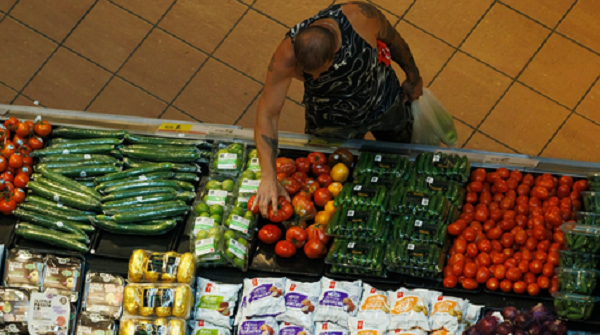Almost half of Canadians choosing less healthy foods due to high food prices
Rising food prices are forcing Canadians to make the difficult dietary choice between nutrition and what they can afford, according to a new survey conducted by Agri-Food Analytics Lab at Dalhousie University.
The report, which surveyed more than 5,000 Canadians, found that nearly 50 per cent are prioritizing the cost of food over nutritional value when grocery shopping, while 63 per cent are worried “that compromising on nutrition due to high food prices may have adverse long-term effects on their health.”
More than 49 per cent of Canadians have reduced the quantity of meat or protein sources they purchase due to increased food costs, while 46 per cent have reduced the amount of fruit and vegetables they consume as a result of food inflation, said Sylvain Charlebois, who runs the lab at Dalhousie and co-authored the report.
“It’s absolutely shocking that there are so many people looking at prices over nutrition,” Charlebois said. “Food inflation will push consumers away from the periphery of the store where highly nutritious, valuable food is.”
Grocery prices rose 6.9 per cent year-over-year in August, showing a slight easing of price growth compared with an 8.5 per cent increase in July, but they are still running much hotter than July’s overall inflation of 3.3 per cent. In August, Canada’s overall inflation rate crept back up to four per cent.
Food insecurity describes inadequate or insecure access to food due to financial constraints. Someone experiencing food insecurity might worry about not having enough to eat or, on the severe end of the spectrum, might even go days without meals. “Moderate” food insecurity is defined as a “compromise in quality and/or quantity of food consumed,” according to Statistics Canada. “Severe” food insecurity is defined as “reduced food intake and disrupted eating patterns.”
A growing number of Canadians are grappling with soaring food costs and lines at food banks across the city have grown dramatically in recent months, as more and more Torontonians find themselves unable to make ends meet amid soaring food costs.
Charlebois said millennials are “unsurprisingly under tremendous pressure compared to other generations.”
“The oldest millennials are 43 or 44 years old now. They have kids, mortgages, they’re economically active,” he said. “These days when you’re economically active, you pay for it.”
Those above the age of 78 had the highest percentage (55 per cent) of respondents prioritizing cost over nutritional value according to the report.
Millennials — anyone born between 1981 and 1996 — have the highest percentage (69 per cent) of respondents expressing concern about compromising nutrition due to high food prices, making them the generation most concerned about the potential health impacts of prioritizing costs.
Canada’s major grocers — Loblaw, Metro, Empire, Walmart and Costco — are facing mounting accusations of profiteering, though executives from the companies denied these allegations earlier this year before a parliamentary committee studying food inflation.
Last week, the grocers agreed to make initial commitments to tackle food prices including “discounts across a basket of food products, price freezes and price matching campaigns,” Industry Minister François-Philippe Champagne announced Thursday.
The minister did not provide further details on how the discounts and price freezes would work or specify which products would be included.
This article was reported by The Star














